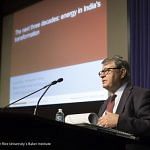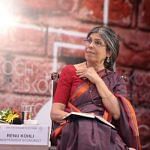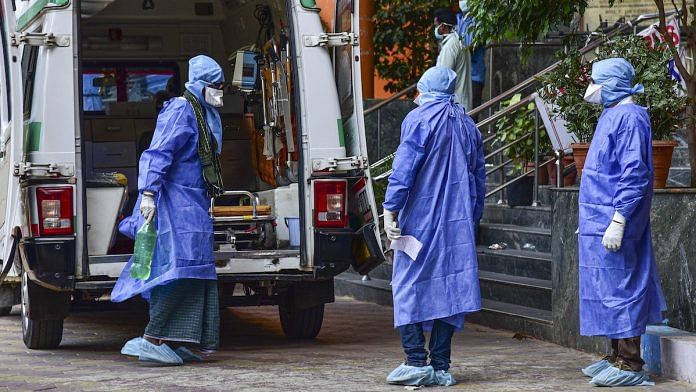 Anatomy of a response
Anatomy of a response
Suman Bery | Non-resident fellow at Bruegel (Brussels) and former director general, NCAER.
The Indian Express
Berry comments on the economic impact of the lockdown needed to fight the coronavirus. He notes two types of impacts that this lockdown will have— first-round effects and second-round effects. First-round refers to the initial response on shutting down international travel and imposing social distancing while second-round refers to the effect of this income reduction, most prominently uncertainty among creditors of affected enterprises particularly micro, small and medium enterprises (MSMEs). He argues that the “urgent objective could be to use the crisis to achieve policy goals that may seem difficult in more normal circumstances” and states “a crisis is a terrible thing to waste” quoting former British prime minister Winston Churchill.
 How policy can bridge the gap
How policy can bridge the gap
Jahangir Aziz | Chief emerging markets economist, JP Morgan Chase Bank.
The Indian Express
Aziz comments on the impact of COVID-19 on the global economy and says “India will not be spared this growth shock” and “the economic impact could be deeper and longer in emerging markets where the capacity of public health systems is limited at the best of times.” He argues that “Income support to the most vulnerable is key. India cannot complain that it does not have the fiscal space or infrastructure to provide it.”
 The age of the neoliberal virus
The age of the neoliberal virus
Tabish Khair | Indian novelist and academic who teaches in Denmark
The Hindu
Khair writes, “The coronavirus that causes the COVID-19 disease is the first neoliberal virus in the world.” He points out at Denmark where there are more than 500 cases and says the disease is neoliberal “despite the structure of social welfare and a very good health system in countries such as Denmark”. He argues that “a major burden of stopping the virus has been passed on to ordinary citizens, who now have to isolate themselves even if they just have a common cold, while the government issues directives but spends as little as possible”
 The world should be wary of smoking the China pipe again
The world should be wary of smoking the China pipe again
V. Anantha Nageswaran | Member of the Economic Advisory Council to the Prime Minister.
Mint
Nageswaran calls the novel coronavirus a “Chinese export”. China should be assigned blame for the outbreak as its initial inaction led to the spread of the virus to the rest of the world, he writes. Even if China’s economy recovered again and was working at full capacity, it would still rely on “exports and an old economy” which means that “China will also go down if the West goes down”, he argues.
 The novel dilemmas presented by a wartime economy
The novel dilemmas presented by a wartime economy
Ajit Ranade | economist and a senior fellow at The Takshashila Institution
Mint
By “fighting an unseen enemy that can kill millions”, Ranade terms the current climate as a “wartime economy”. He examines the “trade-offs” of lockdowns used to contain COVID-19. These include the major economic cost on daily wage earners and the pressure on the government to balance “speed and correctness” in decision-making, he explains.
 Govt is shutting down India for coronavirus, will have to rebuild economy
Govt is shutting down India for coronavirus, will have to rebuild economy
Mahesh Vyas | MD & CEO, CMIE
Business Standard
Vyas explains that the economic cost of lockdowns “is not limited to travel and tourism or hotels and restaurants” especially when India’s “business capital” (i.e. Mumbai) shuts. EMIs and rent don’t stop and neither do interest costs for enterprises or households with borrowings, he writes. Since the government is yet to show “any inclination to foot this bill”, the “cost will be paid by enterprise and by labour”, he adds.
 Covid-19: Where do we stand now?
Covid-19: Where do we stand now?
Atanu Biswas | Professor of statistics at the Indian Statistical Institute, Kolkata
Business Standard
Biswas explains what “flattening the curve” entails in a pandemic and uses historical examples like the 1918 Spanish flu. He also points out that “curves may not be so well-behaved” in reality and that India is nowhere near the “inflexion” point after which the spread of the virus moves at a slower rate. For now it is a wait and watch situation, he adds.
 Corona-crisis needs urgent fiscal intervention
Corona-crisis needs urgent fiscal intervention
Renu Kohli | New Delhi-based macroeconomist
The Financial Express
Kohli explains how the economic shocks from COVID-19 “exceed the 2008 one manifold” especially as it struck during a “three-year long slowdown” in India. What India needs is budgeted expenditures, clarity of immediate fiscal response, “welfare spending that overlaps with stimulus objectives”, targeted income relief and for now, “urgent fiscal support that is spent sensibly, and can be credibly redeemed”, she writes.
 Inoculate against the inevitable
Inoculate against the inevitable 
Rajiv Memani | CEO, EY India
Sudhir Kapadia | National tax leader, EY India
The Economic Times
The authors point out that according to the UN, the economic cost of COVID-19 will be a minimum of $1 trillion in 2020. They suggest cash transfers to the unorganised sector, deferment of repayment of loans for severely impacted sectors, reduced GST rates for hotels and tourism enterprises and a few other measures. “It’s time to start providing immediate support measures to arrest the contagion impact,” they conclude.
Today’s Editorials
Hindustan Times: The daily condemns the attack on a girl from the Northeast in Delhi and says that it reflects deep ignorance and outright racism. It decries the pervasive racism in India, especially against those from the Northeast, and writes that attackers seemed to think that since coronavirus originated in China, ‘Chinese look-alikes’ can be targetted. At this time, when the country must come together to battle the pandemic, to stigmatise an entire group of fellow citizens because of their physical features is criminal, writes HT.
The Indian Express: The daily talks about the incident of ostracisation of the Air India employees by their respective Resident Welfare Associations and writes that history is filled with incidents of people losing their poise during pandemics. However, fear must be tempered with reason and uncertainty with information backed by science, it writes.
The Times of India: TOI expresses concern on the spread of fake news about the coronavirus which can create unwarranted panic. The widespread WhatsApp forwards such as holding a hair dryer close to your threat could kill the virus, could literally cost lives, the daily notes. The government needs to make people understand the importance of relying on trusted sources of information. The social media platforms must also take corrective measures to stop the spread of misinformation, it suggests.
The Hindu: The attack by Maoist extremists in Chhattisgarh’s Sukma, which killed 17 security personnel and injured 15, presents a grim picture of how India continues to do poorly on this front, the daily writes. It is yet to be assessed whether it was an issue of communication breakdown due to which as many as 400 personnel did not rush to aid their uniformed brethren. However, Hindu notes that it is “sad” that Maoists are able to improvise and emerge ahead of security personnels despite their dedicated training.
With inputs from Unnati Sharma






